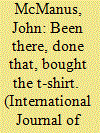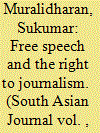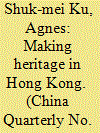| Srl | Item |
| 1 |
ID:
120064


|
|
|
|
|
| Publication |
2013.
|
| Summary/Abstract |
In this article, I explore how the rapid commercialism and commodification of Turkish premier league football has affected the activities of a particular fan group, Çarsi, for the club Besiktas, one of Turkey's oldest teams. I look at how elements of the commodification of football have been harnessed and mediated by Çarsi to make ethical and political statements and convey an anarcho-socialist message. These processes, I argue, are driven by the possibilities opened up by rapid social and technological development. The shift to searching for identity among the forums and video websites of the internet, rather than on the terraces of Besiktas, is profoundly altering how fans construct their allegiance to the fan group and the club. This process, it will be shown, is not so much liberating supporters from the requirements of fandom as it is generating new conventions and processes to which Çarsi members must adhere.
|
|
|
|
|
|
|
|
|
|
|
|
|
|
|
|
| 2 |
ID:
121993


|
|
|
| 3 |
ID:
096594


|
|
|
|
|
| Publication |
2010.
|
| Summary/Abstract |
This article is a case study of state-society-capital conflicts over the preservation of the Central Police Station (CPS) compound in Hong Kong during 2003-08. The conflict was between two fundamentally different approaches to urban space: a cultural economy approach that took culture and space as a source of economic profit, and an opposition discourse of preservation that emphasized cultural, historical and humanistic values as an end. The struggle turned out to be a moderate success for anti-commercialism. Drawing on and extending the notions of collective memory and spatial politics, this article examines how the various civil society actors, in their struggle against commercialism, sought to define and enhance the cultural value of the site through a variety of discourses and practices relating to history and space. It addresses the specific question of why and how certain constructions of collective memory succeed (or fail) to work with certain places in particular instances. The study shows that memories of the CPS compound contained both state-associated and people-associated accounts, between which the former prevailed. The state-associated account was embedded in a familiar, hegemonic story about Hong Kong, which, via an abstract process of symbolization around the notion of the rule of law, successfully turned the compound into an iconic symbol of identification for the city. Beyond this, the civil society actors sought also to generate a sense of lived space associated with the people, and the outcome was mixed.
|
|
|
|
|
|
|
|
|
|
|
|
|
|
|
|